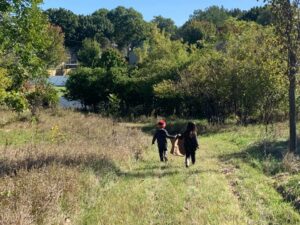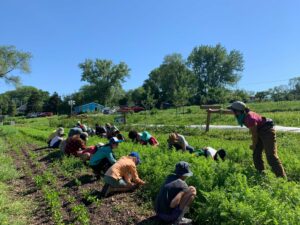Final report for YENC21-169
Project Information
‘Lessons To Go’ will bring sustainable agriculture education and food sovereignty practices to local youth aged 4-18 years old to supplement their on-farm hands-on experiences at KC Farm School's Jr. Growers summer camp and at Ag Explorers, a year-round Saturday farm club; and provide additional lessons for teachers to engage students when they are unable to visit the farm. The farm as the center of its community is the perfect place for intergenerational, collaborative, and participatory food projects, so that bringing youth on-farm, hands-on and sending 'Lessons To Go' with them, they will engage and embrace sustainable agriculture, local food systems, and consider agriculture as a career.
- Develop opportunities aligned with state education standards for urban youth through on-farm, hands-on experiences and supplemental ‘Lessons To Go’ modified for age/ability from the “Sustainable Agriculture Resources and Programs for K-12 Youth” Resources.
- Highlight BIPOC farmer experts in no-till, hydroponics, fruit production, vegetables native to the tropics, and livestock, to increase awareness of sustainable agriculture career opportunities for urban youth.
- Give hands-on farmers market experience to youth.
- Increase food sovereignty in Wyandotte County through the distribution of 60 home gardens to Jr. Growers and Ag Explorers participants.
- Share ‘Lessons To Go’ through our YouTube channel and website, on-farm visits, at conferences, and social media.
Cooperators
- (Educator)
Educational & Outreach Activities
Participation Summary:
In 2021: KC Farm School hosted 125 youth aged 9-14 for a 10 week summer camp (Jr. Growers) from May-August. Families were engaged in weekly activities with their campers and all campers received a 'garden to go' to put their newly acquired sustainable agriculture skills in use in their own backyards. Weekly, Jr. Growers created a product to sell at the on-farm farmers market and assisted in market set-up, organization, sales and clean-up.
From March-October 2021, KC Farm School staff engaged 80, 4-8 year olds and their families through a monthly farm club. Ag Explorers sign up for a monthly session, meet every Saturday through the month and engage in one hour of on-farm agriculture experiences including chicken care, planting, harvesting, greenhouse production, and soil preparation. They then engage in one hour of S.T.E.A.M lessons ranging from agriculture art to cooking to water conservation.
Throughout 2021, 225 youth aged 4-18 engaged in on-farm field trips and service learning opportunities in which they learned hands-on about sustainable agriculture. Program curriculum was created by KC Farm School in collaboration with BIPOC (Black Indigenous People of Color) farmers, volunteer environmental scientists, engineers, educators and community members and was piloted through the programs named above. Feedback was solicited and integrated into the updated curriculum. Tours of KC Farm School's two urban farms (Gibbs Road Farm and Common Ground) and demonstrations (including rain garden installation, Johnson-Su building, no-till methods, hugelkultur build) were embedded in all programs named above.
2022: Four complete units of lessons based on the 5E model called "Lessons to Go" were created in collaboration with the education committee named above, Mike Pearl of Pearl Family Farm, Angelica Michel of Spicy Mama's Salsa, KC Farm School farmers and farm crew, and Erika Noguera of Doña Fina Cafe. The lessons were used in on-farm field trips, Jr. Growers, Ag Explorers and will be posted on the organization's website in 2023. In 2022, 839 youth engaged with the lessons on-farm through field trips, 60 through Ag Explorers and 69 through Jr. Growers.
400 parents, 20 classroom educators, 100 other adults including chaperones and assistants and 7 farmers participated in this project.
Learning Outcomes
Sustainable Agriculture
Agriculture as a career
Increase in awareness in participating youth of both sustainable agriculture as a career option and as a lifestyle was measured using youth interviews, youth skills progression as measured on KC Farm's Schools created "Matrix of Ag Skills" and guardian feedback surveys. The "Lessons to Go" include pre and post assessments to measure content knowledge gained since the on-farm experience will not be the primary means of assessment. All of the feedback received has been positive and shown gains in knowledge and awareness to date among participants.
A parent says of Jr. Growers camp: "Whenever I asked my sons about their experience, they said: “It was amazing!” They were excited to go back each day and sad when the week was over. My sign of a great camp!!"
Another guardian says: "Our kid comes from a long line of agriculture experts, but has never shown a lot of personal interest. But every day he and his buddies had new stories about composting, weeding, growing, feeding, that they were thrilled about! He ended camp by saying that he wanted to do more farming work, which we were thrilled about. Loved the staff and kiddos who participated. The age mixing was perfect."
Project Outcomes
Information Products
- Lessons to Go: Diversity in Farming (Manual/Guide)
- Lessons to Go: The Farm as an ecosystem (Manual/Guide)
- Lessons to Go: Farm to Market (Manual/Guide)
- Lessons to Go: Global Farming (Manual/Guide)
- YouTube Playlist of videos to accompany Lessons to Go (Course or Curriculum)

